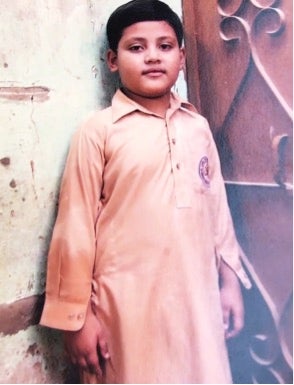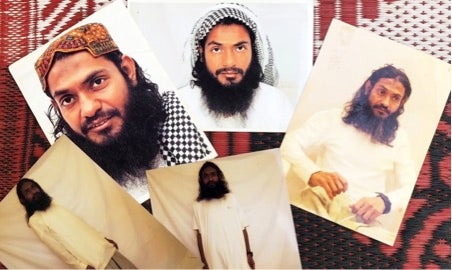Son of Guantanamo Bay detainee found about his father’s imprisonment on Google
Born after his father's arrest, Jawad Rabbani, son of Guantanamo Bay prisoner Ahmed Rabbani tells his story
Your support helps us to tell the story
From reproductive rights to climate change to Big Tech, The Independent is on the ground when the story is developing. Whether it's investigating the financials of Elon Musk's pro-Trump PAC or producing our latest documentary, 'The A Word', which shines a light on the American women fighting for reproductive rights, we know how important it is to parse out the facts from the messaging.
At such a critical moment in US history, we need reporters on the ground. Your donation allows us to keep sending journalists to speak to both sides of the story.
The Independent is trusted by Americans across the entire political spectrum. And unlike many other quality news outlets, we choose not to lock Americans out of our reporting and analysis with paywalls. We believe quality journalism should be available to everyone, paid for by those who can afford it.
Your support makes all the difference.This article first appeared on our partner site, Independent Urdu
"I found out about my father's case from Google when I was 12 or 13 years old. I read about his story on Wikipedia. My name is Jawad. I am the son of Ahmed Rabbani who is in Guantanamo Bay. I am 17 years old and I have never met my father, nor has he ever met me.” These were the words of Jawad Rabbani, son of Ahmed Rabbani, who is imprisoned in Guantanamo Bay.
"I was born five or six months after my father went to prison," he said. “When I was younger, I would never tell my friends who my father was or where he was. I used to say he was dead. When we first spoke to him, he said he was in prison. I asked him, ‘Why are you in prison? Only bad people go to prison’ at which he laughed.”
undefined
"The Americans are afraid that I shall starve to death, so they force-feed me every day, and this is no less than torture," he further wrote in the letter.
Five thousand dollar deal in the Musharraf era
According to official US Department of Defence documents published in the New York Times, Rabbani is a member of Al-Qaeda and a threat to US national security. According to these documents, Muhammad Ahmad Rabbani, a Pakistani citizen born in Saudi Arabia, has admitted to being an Al-Qaeda facilitator, and has admitted to working directly for Al-Qaeda's senior strategist Khalid Sheikh Mohammed.

According to the Department's findings, Rabbani poses a "high risk" to US interests and should be kept in custody.
Clive Stafford, founder of the UK-based human rights organisation Reprieve, and who is fighting a legal case for Ahmed Rabbani, told Independent Urdu that Rabbani had no links to Al-Qaeda or any other terrorist organisation, and that these confessions had been obtained from him through torture.
According to a report by the US Senate Intelligence Committee, Ahmed Rabbani was subjected to “Enhanced Interrogation”, which amounts to torture.
Stafford says Pakistani authorities extradited Rabbani having misidentified him as terrorist Hassan Gul, to the United States in exchange for USD 5,000. He was then taken to Kabul's Bagram prison.
What is odd is that Hassan Gul himself was arrested in 2004 and held with Rabbani in the same Bagram prison, and was released by the Americans after three years captivity. According to Stafford, Hassan Gul resumed his terrorist activities and was killed in a drone strike in Waziristan in 2012.

Hunger strike until death
However, Ahmed Rabbani has remained in custody throughout this time, and is still being held at Guantanamo Bay where he has initiated a hunger strike in protest against his imprisonment.
"Due to the continuous hunger strike, Rabbani’s weight has come down to only 37 kg, and he is force fed liquid food daily through a tube," said Stafford.
Mehwish Hayat Khan, a human rights lawyer from Reprieve and author of My Guantanamo Diary, told Independent Urdu, "Ahmed Rabbani was arrested on the basis of a misidentification. The United States has admitted that Rabbani is not on their wanted list but he is still being held captive. This is a violation of the Geneva Convention, international law and the US Constitution. He has seen 740 out of 780 prisoners being released in front of his eyes, which has left him very depressed.”
In his letter to Independent Urdu, Rabbani writes that he has no option but to go on a hunger strike until death. “They have held me captive for more than 18 years and there is no end to this torment in sight.”
Rabbani writes that on the 10th of September 2002, he was sold to the Americans having been confused with a notorious terrorist named Hassan Gul. The Americans took him to Kabul, where, according to Rabbani, he was subjected to the worst forms of torture. He added, “My team of pro-bono American lawyers have documented 60 methods of torture ranging from beating to a fake hanging.”
Dark Ages Morality
Rabbani writes that the Americans are afraid that he might die of starvation, so “they force-feed me daily by inserting a three and a half foot long tube in my nose. They are trying to keep me alive, not because they care about me, but because if I die, it will reflect badly upon them.”
"They have ruined my life, destroyed my family and subjected me to methods of torture used in the Dark Ages," Rabbani wrote in the letter.
Rabbani mentions an incident in the letter, “One day I was wearing a long T-shirt that came down to my knees. I called the supervisor and asked him to take a photograph of me so that he could use it in his medical class. Students should learn what a person looks like shortly before his death.”
Describing his own condition, Rabbani writes, “I am nothing but skin and bones and I move around with the help of a cane. I'm only 51 but I look like a 95 year-old. I saw my shadow through the window and thought I might be in the movie "Unbroken" which showed American pilots who died of starvation as prisoners of war in World War II.”
Why is he tortured?
Explaining the reason, Rabbani writes, "My American kidnappers want me to sell my conscience and my caste for a little food, to betray my religion and morals. It is not possible for me to do that. "
It is a sign of Rabbani's despair that he writes, “Perhaps I will finally go to my family in a coffin and escape from Guantanamo completely. I hope that doesn't happen. But they think that after all these years, they can weaken my peaceful protest with more violence. It's not going to happen, so I just have to follow the path that has been chosen until the government of Pakistan takes me to my family.”
Reprieve has created a website about Ahmed Rabbani's hunger strike, which can be viewed here.
Ahmed Rabbani's son Jawad Rabbani, who is studying in Karachi, says, "If someone commits a crime and is convicted of it, then it is a different matter, but we do not know why my father is in jail, and neither does he."
Rabbani continues, "I also wrote a letter to President Trump but there was no response. I don't know if he saw the letter or not. I think the US is a superpower, but if it can't do justice, then why is it a superpower?”
Translated by Taimur Rehman, Edited and proofread by Tooba Ali & Celine Assaf

Join our commenting forum
Join thought-provoking conversations, follow other Independent readers and see their replies
Comments